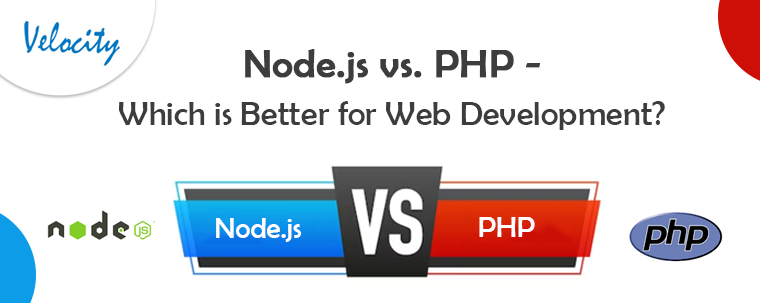Web development is a constantly evolving field, with new technologies and frameworks emerging all the time. Two of the most popular and widely used technologies for building web applications are Node.js and PHP. Both have their strengths and weaknesses, and in this blog post, we will compare the two to help you determine which is best for your next web development project.
Overview of Node.js and PHP
Node.js is a JavaScript runtime built on Chrome’s V8 JavaScript engine. It allows developers to run JavaScript on the server side and has become increasingly popular in recent years thanks to its performance and scalability. It uses an event-driven, non-blocking I/O model, making it lightweight and efficient for real-time, data-intensive applications such as chat apps and real-time analytics. Node.js has a large and growing ecosystem with many popular libraries and frameworks, such as Express.js and Meteor.js.
PHP is a server-side scripting language that has been around since the early days of the web. It is widely supported and has a large community of developers. It is suitable for building traditional web applications such as content management systems and e-commerce sites. PHP supports many databases and servers and can easily integrate with HTML, CSS, and JavaScript. It also has a large ecosystem with popular frameworks like Laravel and Symphony.
Both Node.js and PHP have their strengths and weaknesses, and the choice between them will depend on your specific project requirements and the skills of your development team.
Comparison of Node.js and PHP
When comparing Node.js and PHP, several vital factors exist, including performance, ecosystem, and use cases.
Performance:
In terms of performance, Node.js has a clear advantage over PHP. Node.js is built on an event-driven, non-blocking I/O architecture, which makes it extremely fast and scalable. On the other hand, PHP is single-threaded and can struggle with high-traffic loads.
Ecosystem:
Node.js has a large and growing ecosystem, with many popular libraries and frameworks available, such as Express.js and Meteor.js. PHP also has a large ecosystem with popular frameworks like Laravel and Symphony.
Use Cases:
Node.js excels in building real-time, data-intensive applications such as chat apps and real-time analytics. PHP is better suited for building traditional web applications, such as content management systems and e-commerce sites.
Now, let’s take a look at the pros and cons of each technology:
Pros of using Node.js:
- Event-driven, non-blocking I/O architecture makes it fast and scalable. It’s perfect for real-time, data-intensive applications.
- A large and growing ecosystem with many popular libraries and frameworks, such as Express.js and Meteor.js.
- JavaScript is a widely-used language, making it easy to find developers.
- It’s excellent for building microservices.
- The NPM (Node Package Manager) is a great tool to manage dependencies and simplify the development process.
Cons of using Node.js:
- Single-threaded nature is only suitable for some applications, such as those requiring heavy computational tasks.
- Lack of some features found in other languages, such as built-in support for multithreading.
- The JavaScript runtime can be less stable than other languages.
- Some developers may find it less mature compared to other technologies.
- There may be better options for building monolithic applications.
Pros of using PHP:
- Widely supported and has a large community of developers, which makes it easy to find help and resources.
- Suitable for building traditional web applications such as content management systems and e-commerce sites.
- Support for many databases and servers, like MySQL, and can easily integrate with HTML, CSS, and JavaScript.
- It has a large ecosystem with popular frameworks like Laravel and Symphony, which can help speed up development and improve the application’s overall performance.
- PHP is relatively easy to learn and use, making it an excellent choice for beginners.
Cons of using PHP:
- Performance limitations and limited scalability compared to other technologies like Node.js, especially under high traffic loads.
- Some developers may find it less modern and more complicated than other technologies.
- Security issues: PHP has had a history of security vulnerabilities and requires developers to be cautious while developing and deploying applications.
- There may be better choices for building real-time, data-intensive applications.
- It may not be suitable for building microservices.
Whether you use Node.js or PHP, it’s essential to have a team of experienced developers who can make the most of that tool and choose the right tool for the job.
Node.js vs. PHP – Which is Better for Web Development?
It’s hard to say which is “supreme” as both Node.js and PHP have their strengths and weaknesses, and the choice between the two will depend on the specific project requirements and the development team’s skills.
Node.js is an excellent choice for building real-time, data-intensive applications, thanks to its event-driven, non-blocking I/O architecture that makes it fast and scalable. It’s also great for building microservices and its growing ecosystem with many popular libraries and frameworks. JavaScript is a widely-used language, making it easy to find developers.
On the other hand, PHP is better suited for building traditional web applications, such as content management systems and e-commerce sites. It is widely supported and has a large community of developers, which makes it easy to find help and resources. PHP has a large ecosystem with popular frameworks like Laravel and Symphony, which can help speed up development and improve the application’s overall performance. It’s relatively easy to learn and use, making it an excellent choice for beginners.
Ultimately, it’s essential to choose the right tool for the job and to have a team of experienced developers who can make the most of that tool. Both Node.js and PHP are powerful technologies that can be used to build high-performing web applications.
Conclusion
Both Node.js and PHP have their strengths and weaknesses. Node.js is an excellent choice for building real-time, data-intensive applications, while PHP is better suited for building traditional web applications. Ultimately, the choice between the two will depend on your specific project requirements and the skills of your development team.










